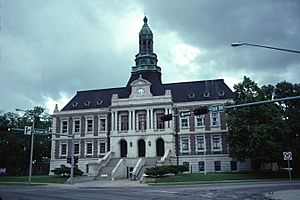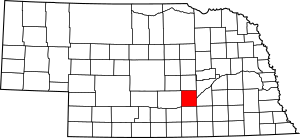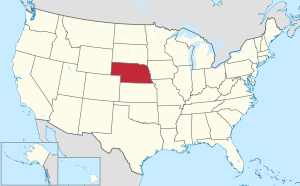Hall County, Nebraska facts for kids
Quick facts for kids
Hall County
|
|
|---|---|

Hall County Courthouse in Grand Island
|
|

Location within the U.S. state of Nebraska
|
|
 Nebraska's location within the U.S. |
|
| Country | |
| State | |
| Founded | 1858 |
| Named for | Augustus Hall |
| Seat | Grand Island |
| Largest city | Grand Island |
| Area | |
| • Total | 552 sq mi (1,430 km2) |
| • Land | 546 sq mi (1,410 km2) |
| • Water | 5.9 sq mi (15 km2) 1.1%% |
| Population
(2020)
|
|
| • Total | 62,895 |
| • Density | 113.94/sq mi (43.99/km2) |
| Time zone | UTC−6 (Central) |
| • Summer (DST) | UTC−5 (CDT) |
| Congressional district | 3rd |
Hall County is a special area of land called a county in the state of Nebraska. It's like a big neighborhood with its own local government. In 2020, about 62,895 people lived here, making it the fourth biggest county in Nebraska by population.
The main city and government center of Hall County is Grand Island. The county was created a long time ago in 1858. It was named after Augustus Hall, who was an important judge in the area back then.
Hall County is part of the Grand Island Metropolitan Statistical Area. This just means it's connected to the larger city area of Grand Island.
If you see a Nebraska license plate with the number 8 at the start, it means the car is from Hall County! This system started in 1922, and Hall County had the eighth-highest number of registered vehicles at that time.
Contents
Geography of Hall County
Hall County is home to some important rivers. The Platte River flows across the southern part of the county, and the South Loup River flows through the northwest. Both of these rivers eventually join the big Missouri River.
The total size of Hall County is about 552 square miles. Most of this is land (546 square miles), and a small part (5.9 square miles) is water.
Hall County has a lot of tornado activity. It has the highest number of tornadoes per square mile in Nebraska. This means it gets about four times more tornadoes than the average for the rest of the state!
Main Roads and Highways
Many important roads help people travel through Hall County.
 Interstate 80
Interstate 80 U.S. Route 30
U.S. Route 30 U.S. Route 34
U.S. Route 34 U.S. Route 281
U.S. Route 281 Nebraska Highway 2
Nebraska Highway 2 Nebraska Highway 11
Nebraska Highway 11
Public Transportation
You can find bus services in Hall County that help people get around.
- Burlington Trailways
- Express Arrow
Neighboring Counties
Hall County shares its borders with several other counties.
- Merrick County – to the northeast
- Hamilton County – to the east
- Adams County – to the south
- Kearney County – to the southwest
- Howard County – to the north
- Buffalo County – to the west
Nature and Protected Areas
Hall County has several areas set aside for nature and wildlife. These are great places to explore the outdoors.
- Cheyenne State Recreation Area
- Cornhusker State Wildlife Management Area
- Denman Island State Wildlife Management Area (part)
- Hannon Federal Waterfowl Production Area
- Loch Linda State Wildlife Management Area
- Martins Reach State Wildlife Management Area
- Mormon Island State Recreation Area
- Wood River West State Wildlife Management Area
People of Hall County
| Historical population | |||
|---|---|---|---|
| Census | Pop. | %± | |
| 1860 | 116 | — | |
| 1870 | 1,057 | 811.2% | |
| 1880 | 8,572 | 711.0% | |
| 1890 | 16,513 | 92.6% | |
| 1900 | 17,206 | 4.2% | |
| 1910 | 20,361 | 18.3% | |
| 1920 | 23,720 | 16.5% | |
| 1930 | 27,117 | 14.3% | |
| 1940 | 27,523 | 1.5% | |
| 1950 | 32,186 | 16.9% | |
| 1960 | 35,757 | 11.1% | |
| 1970 | 42,851 | 19.8% | |
| 1980 | 47,690 | 11.3% | |
| 1990 | 48,925 | 2.6% | |
| 2000 | 53,534 | 9.4% | |
| 2010 | 58,607 | 9.5% | |
| 2020 | 62,895 | 7.3% | |
| 2023 (est.) | 62,197 | 6.1% | |
| US Decennial Census 1790-1960 1900-1990 1990-2000 2010 |
|||
In 2020, the population of Hall County was 62,895 people. The county is home to a diverse group of people. About 62.9% of the population identified as White, 3.9% as Black or African American, and 2.7% as Native American. About 1.4% were Asian, and 0.6% were Pacific Islander. Another 1.7% were from two or more races. A significant portion, 31.4%, of the people in Hall County identified as Hispanic or Latino.
Communities in Hall County
Hall County has several towns and cities where people live.
Cities
- Grand Island
- Wood River
Villages
Unincorporated Communities
These are smaller communities that are not officially cities or villages.
See also
 In Spanish: Condado de Hall (Nebraska) para niños
In Spanish: Condado de Hall (Nebraska) para niños
 | George Robert Carruthers |
 | Patricia Bath |
 | Jan Ernst Matzeliger |
 | Alexander Miles |

